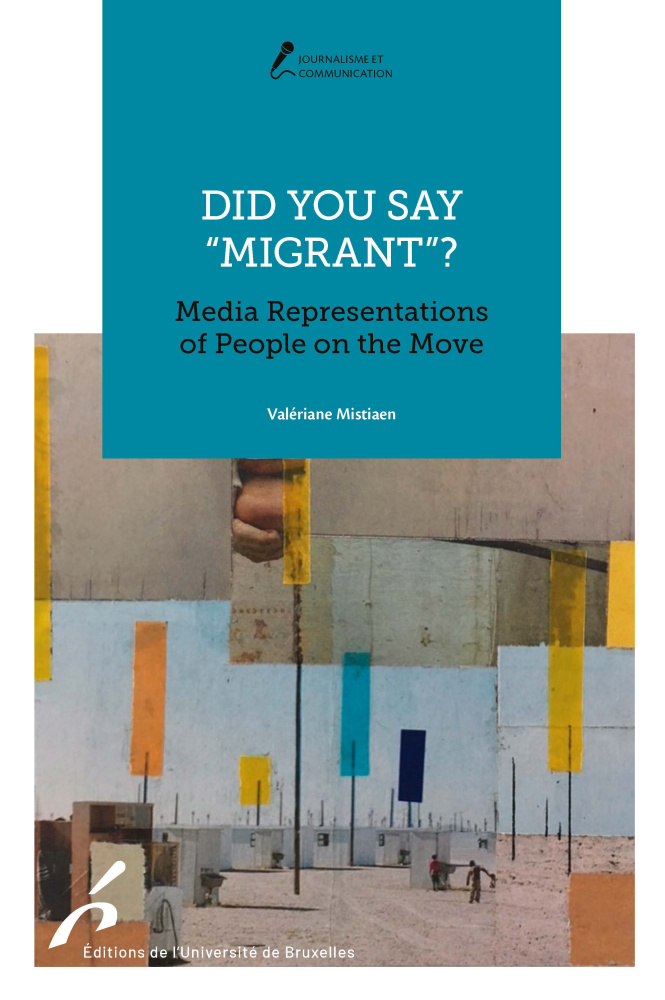Did you say "migrant"?
Media Representations of People on the Move
Première édition
The 2011 war in Syria triggered a wave of people seeking asylum in Europe, bringing immigration into the political and media spotlight and sparking numerous debates on displaced people. These debates have been marked by a heightened focus on the terminology used to describe people on the move. Lire la suite
Terms such as refugee, migrant, immigrant, asylum seeker, illegal immigrant, and displaced person have circulated in the media, often blurring our understanding of events or conveying contradictory representations of those involved. Moreover, the words used to define people on the move are not fixed in time; their meaning and reference emerge from events and social representations, shaping both the public issue of migration and the image of the social actors concerned.
Using a discursive approach that combines discourse analysis and corpus linguistics, this book examines how the Belgian media referred to displaced people. It is innovative in three key ways. Firstly, it analyses media coverage in both the French- and Dutch-speaking communities of Belgium, allowing for comparisons of how migration was represented in two culturally, linguistically, and politically distinct regions of the same country. Secondly, it studies both written and audiovisual media, drawing on an extensive dataset of 13,391 press articles and 3,490 television news items. Finally, it goes beyond the most commonly used terms related to migration, exploring a significantly broader range of designations than have previously been studied.
This book contributes to the understanding of how language shapes social debates and is an essential resource for anyone interested in the multilingual analysis of media texts.
Spécifications
- Éditeur
- Éditions de l'Université de Bruxelles
- Auteur
- Valériane Mistiaen,
- Collection
- Journalisme et communication | n° 7
- ISSN
- 27362116
- Langue
- anglais
- CLIL (Version 2013-2019 )
- 3157 Sciences de l'information et de la communication
- Date de première publication du titre
- 03 juillet 2025
Livre broché
- Date de publication
- 03 juillet 2025
- ISBN-13
- 978-2-8004-1908-4
- Ampleur
- Nombre absolu de pages : 292
- Code interne
- 1908
- ONIX XML
- Version 2.1, Version 3
Google Livres Aperçu
Sommaire
Preliminary Remarks
Abbreviations
Corpus Linguistics Glossary
Introduction
Europe in crisis: between incertitude and doubts
Belgium, a two-speed country
Research question, corpus and methodology
Outcome of the book
Book structure
Chapter 1 - Denominations: A Cornerstone of the Discursive Construction of Public Issues in the Media
1.1 Discourse, a social practice in which denomination plays a central role
1.2 Discursive Semantics
1.3 Is naming an objective act?
1.4 The narration of public issues
Conclusion
Chapter 2 - Migration, A Prominent Public Issue Broadcast through the Media
2.1 The constitution of migration as a public issue
2.2 How the media portrays migration
2.3 How the media names the protagonists of the migratory crisis
Conclusion
Chapter 3 - Belgium, a Case Study
3.1 Legal framework of migration in Belgium
3.2 The 2015–2017 migratory crisis in Belgium
3.3 The Belgian media landscape
Conclusion
Chapter 4 - Research Question, Corpus & Methodology
4.1 Research Question and variables
4.2 Corpus
4.3 The articulation of the quantitative and qualitative methods
Conclusion
Chapter 5 - Lexical Repertoire of Denominations in Dutch and French
5.1 People denominations/designations in the DLC
5.2 People denominations/designations in the FLC
5.3 A corpus comparison starts with statistics
5.4 A lexico-syntactic taxonomy
Conclusion
Chapter 6 - Variations in the Repertoire of Legal Denominations
6.1 Refugee, the Holy Grail
6.2 Asylum seeker, the mainstream label
6.3 The polysemy of foreigner
6.4 The lexical proximity of refugee and asylum seeker, opposed to foreigner
Chapter 7 - Variations in the Repertoire of Nonlegal Statistical Denominations
7.1 Migrant: from a neutral denomination to a negatively connotated term
7.2 Non-axiological designations referring to a nationality: ethnonyms
7.3 Newcomers and oldcomers: buzzwords in Belgian political discourse?
7.4 Allochthone, a loan word
7.5 The legitimate Syrians and vulnerable minors opposed to the unwelcomed migrants, not to mention the others
Chapter 8 - Variations in the Repertoire of Nonlegal and Nonstatistical Denominations
8.1 Non-axiological denominations referring to kinship
8.2 Common-language non-axiological denominations and designations
8.3 Denominations and designations stemming from the activist discourse
8.4 Denominations and designations stemming from the political discourse
8.5 Media discourse: a place where political and activist denominations circulate
Conclusion: Of the Importance of Denominations
French- and Dutch-language media use a different lexical repertoire
The same denominations have a different meaning in the media of both linguistic communities
Newspapers and TV news items display a different lexical repertoire
(Public) quality and popular media outlets use a different lexical repertoire
Denominations that name the protagonists of the 2015–2017 migratory crisis evolve over time
Combination of the deductive and inductive approach
The big picture
Bibliography

